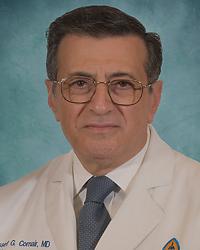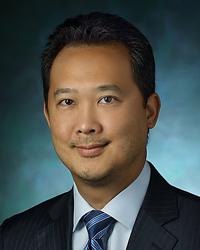-
Shih-Chun Lin, MD PhD

- Chair, Department of Surgery, Suburban Hospital, Johns Hopkins Medicine
Expertise: Brain and Tumor Neurosurgery, Skull Base Surgery, Spine Surgery, Neurosurgery
Primary Location: Johns Hopkins Health Care & Surgery Center — Bethesda, Bethesda, MD
-
Youssef Georges Comair, MD

Expertise: Neuro-Oncology, Brain and Tumor Neurosurgery, Neurosurgery
Primary Location: Johns Hopkins Health Care & Surgery Center — Bethesda, Bethesda, MD
-
Louis Chang, MD

Expertise: Neurosurgery
Primary Location: Johns Hopkins Health Care & Surgery Center — Bethesda, Bethesda, MD
Surgical Oncology
Medical Oncology
-
Solmaz Sahebjam, MD

- Director of Neurooncology Program in National Capital Region
Expertise: Medical Oncology
Primary Location: Sibley Memorial Hospital, Washington, DC
-
Matthias Holdhoff, MD PhD

- Co-Director, Brain Cancer Disease Group, Sidney Kimmel Comprehensive Cancer Center
Expertise: Medical Oncology
Primary Location: Skip Viragh Outpatient Cancer Center, Baltimore, MD
Radiation Oncology
-
Brandi R. Page, MD

- Associate Residency Program Director, Radiation Oncology Residency, Johns Hopkins University School of Medicine
Expertise: Head and Neck Radiation Oncology, Radiation Oncology
Primary Location: Johns Hopkins Health Care & Surgery Center — Bethesda, Bethesda, MD
-
Carmen Kut, MD PhD

Expertise: Radiation Oncology
Primary Location: Sibley Memorial Hospital, Washington, DC
-
Victoria Jane Croog, MD

- Department of Radiation Oncology, Sibley Memorial Hospital
Expertise: Radiation Oncology
Primary Location: Sibley Memorial Hospital, Washington, DC
-
Matthew M. Ladra, MD MPH

- Director, Pediatric Radiation Oncology, Johns Hopkins Kimmel Cancer Center at Sibley Memorial Hospital
Expertise: Radiation Oncology
Primary Location: Sibley Memorial Hospital, Washington, DC
Surgical Oncology
-
Bonnie Sun, MD

- Breast Surgery Clinical Associate
Expertise: Breast Surgical Oncology, Breast Surgery
Primary Location: Johns Hopkins Health Care & Surgery Center — Bethesda, Bethesda, MD
-
Pamela Ann Wright, MD

- Medical Director of the Suburban Hospital Breast Center
Expertise: Breast Surgery, Breast Surgical Oncology
Primary Location: Johns Hopkins Health Care & Surgery Center — Bethesda, Bethesda, MD
-
Maureen O'Donnell-DeBritz, MD

- Breast Surgery Clinical Associate
Expertise: Breast Surgical Oncology, Breast Surgery
Primary Location: Sibley Memorial Hospital, Washington, DC
-
Hanh-Tam Tran, MD

- Breast Surgery Clinical Associate
Expertise: Breast Surgical Oncology, Breast Surgery
Primary Location: Sibley Memorial Hospital, Washington, DC
Surgery
-
Martin G. Paul, MD

Expertise: Gastrointestinal Minimally Invasive Surgery, General Surgery
Primary Location: Sibley Memorial Hospital, Washington, DC
-
Gabriel David Ivey, MD

Expertise: Surgical Oncology, Gastrointestinal Surgical Oncology, Hepatobiliary and Pancreatic Surgery
Primary Location: Sibley Memorial Hospital, Washington, DC
-
Vincent Obias, MD MS

- Chief of Colorectal Surgery, Johns Hopkins Medicine, National Capital Region
Expertise: Colon and Rectal Surgery
Primary Location: Johns Hopkins Health Care & Surgery Center — Bethesda, Bethesda, MD
-
Ada Elizabeth Graham, MD

Expertise: Colon and Rectal Surgery
Primary Location: Johns Hopkins Health Care & Surgery Center — Bethesda, Bethesda, MD
-
Katherine Graw Lamond, MD

- Chair, Department of Surgery Sibley Memorial Hospital
Expertise: General Surgery, Bariatric Surgery
Primary Location: Sibley Memorial Hospital, Washington, DC
-
Andrew Jung, MD

Expertise: Bariatric Surgery, General Surgery
Primary Location: Sibley Memorial Hospital, Washington, DC
-
Brett C. Parker, MD

Expertise: Feeding and Swallowing Disorders, Gastrointestinal Surgery, Gastrointestinal Minimally Invasive Surgery, Gastrointestinal Motility Disorders, Bariatric Surgery
Primary Location: Sibley Memorial Hospital, Washington, DC
-
Kelly Jeanne Lafaro, MD MPH

Expertise: Hepatobiliary and Pancreatic Surgery, Surgical Oncology
Primary Location: Skip Viragh Outpatient Cancer Center, Baltimore, MD
Radiation Oncology
-
Stephen C Greco, MD

- Clinical Director, The Kimmel Cancer Center Radiation Oncology at Suburban Hospital
Expertise: Radiation Oncology
Primary Location: Johns Hopkins Health Care & Surgery Center — Bethesda, Bethesda, MD
-
Rachit Kumar, MD

Expertise: Radiation Oncology
Primary Location: Sibley Memorial Hospital, Washington, DC
Medical Oncology
-
Mary Judith Wilkinson, MD

- Clinical Director, Under Armour Breast Health Innovation Center, Sidney Kimmel Comprehensive Cancer Center
Expertise: Medical Oncology
Primary Location: Sibley Memorial Hospital, Washington, DC
-
Bruce R Kressel, MD

Expertise: Hematology Oncology, Medical Oncology
Primary Location: Sibley Memorial Hospital, Washington, DC
-
Princess Mark-Adjeli, MD

- Clinical Associate
Expertise: Medical Oncology
Primary Location: Sibley Memorial Hospital, Washington, DC
Radiation Oncology
-
Akila Viswanathan, MD MPH

- Director, Johns Hopkins Radiation Oncology and Molecular Radiation Sciences
Expertise: Radiation Oncology
Primary Location: Sidney Kimmel Comprehensive Cancer Center, Baltimore, MD
-
Victoria Jane Croog, MD

- Department of Radiation Oncology, Sibley Memorial Hospital
Expertise: Radiation Oncology
Primary Location: Sibley Memorial Hospital, Washington, DC
-
Susan Fletcher Stinson, MD

- Medical Director, Suburban Hospital Cancer Program
Expertise: Radiation Oncology
Primary Location: Johns Hopkins Health Care & Surgery Center — Bethesda, Bethesda, MD
Surgery
-
Shaun C. Desai, MD

- Chief of Facial Cosmetic Surgery
Expertise: Aesthetic Plastic Surgery, Craniofacial Plastic Surgery, Facial Plastic Surgery, Otolaryngology
Primary Location: Johns Hopkins Health Care & Surgery Center — Bethesda, Bethesda, MD
-
Nyall R. London, MD PhD

Expertise: Skull Base Surgery, Rhinology, Sinus, and Skull Base Surgery, Rhinology and Sinus Surgery, Otolaryngology
Primary Location: Johns Hopkins Health Care & Surgery Center — Bethesda, Bethesda, MD
-
Murugappan Ramanathan, MD

- Vice Director of Clinical Operations
Expertise: Skull Base Surgery, Rhinology, Sinus, and Skull Base Surgery, Rhinology and Sinus Surgery, Otolaryngology
Primary Location: Johns Hopkins Health Care & Surgery Center — Bethesda, Bethesda, MD
-
Wojtek Mydlarz, MD

- Director, Head and Neck Surgery - National Capitol Region
Expertise: Skull Base Surgery, Endocrine Surgery, Head and Neck Surgical Oncology, Head and Neck Surgery, Otolaryngology
Primary Location: Johns Hopkins Health Care & Surgery Center — Bethesda, Bethesda, MD
-
Wayne Martin Koch, MD

Expertise: Endocrine Surgery, Head and Neck Surgical Oncology, Head and Neck Surgery, Otolaryngology
Primary Location: Johns Hopkins Outpatient Center, Baltimore, MD
-
Vaninder Dhillon, MD

Expertise: Endocrine Surgery, Laryngology, Otolaryngology
Primary Location: Johns Hopkins Health Care & Surgery Center — Bethesda, Bethesda, MD
-
Simon R. Best, MD

- Director, Otolaryngology-Head and Neck Surgery, Johns Hopkins Bayview Medical Center
Expertise: Gender Affirming Care, Laryngology, Otolaryngology
Primary Location: Johns Hopkins Outpatient Center, Baltimore, MD
-
Alexander Tell Hillel, MD

Expertise: Laryngology, Otolaryngology
Primary Location: Johns Hopkins Outpatient Center, Baltimore, MD
-
Deepa J. Galaiya, MD

- Associate Residency Program Co-Director
Expertise: Otology, Neurotology, Otolaryngology
Primary Location: Johns Hopkins Health Care & Surgery Center — Bethesda, Bethesda, MD
-
Wade W. Chien, MD

Expertise: Otology, Neurotology, Otolaryngology
Primary Location: Johns Hopkins Health Care & Surgery Center — Bethesda, Bethesda, MD
-
Jason C. Nellis, MD

Expertise: Aesthetic Plastic Surgery, Facial Plastic Surgery, Craniofacial Plastic Surgery, Otolaryngology
Primary Location: Sibley Memorial Hospital, Washington, DC
Surgery
-
Wojtek Mydlarz, MD

- Director, Head and Neck Surgery - National Capitol Region
Expertise: Skull Base Surgery, Endocrine Surgery, Head and Neck Surgical Oncology, Head and Neck Surgery, Otolaryngology
Primary Location: Johns Hopkins Health Care & Surgery Center — Bethesda, Bethesda, MD
-
Mary Ella Montgomery Carter, MD

Expertise: Plastic Surgery
Primary Location: Mary Ella Montgomery Carter, Washington, DC
-
Gabriel David Ivey, MD

Expertise: Surgical Oncology, Gastrointestinal Surgical Oncology, Hepatobiliary and Pancreatic Surgery
Primary Location: Sibley Memorial Hospital, Washington, DC
-
Jason C. Nellis, MD

Expertise: Aesthetic Plastic Surgery, Facial Plastic Surgery, Craniofacial Plastic Surgery, Otolaryngology
Primary Location: Sibley Memorial Hospital, Washington, DC
-
Shaun C. Desai, MD

- Chief of Facial Cosmetic Surgery
Expertise: Aesthetic Plastic Surgery, Craniofacial Plastic Surgery, Facial Plastic Surgery, Otolaryngology
Primary Location: Johns Hopkins Health Care & Surgery Center — Bethesda, Bethesda, MD
-
Nyall R. London, MD PhD

Expertise: Skull Base Surgery, Rhinology, Sinus, and Skull Base Surgery, Rhinology and Sinus Surgery, Otolaryngology
Primary Location: Johns Hopkins Health Care & Surgery Center — Bethesda, Bethesda, MD
-
Nicholas Mahoney, MD

- Chief, Oculoplastics Division
Expertise: Ophthalmic Plastic and Reconstructive Surgery
Primary Location: Johns Hopkins Health Care & Surgery Center — Bethesda, Bethesda, MD
Medical Oncology
-
Evan Lipson, MD

Expertise: Head and Neck Medical Oncology, Medical Oncology
Primary Location: Sibley Memorial Hospital, Washington, DC
-
Karim Boudadi, MD

Expertise: Head and Neck Medical Oncology, Hematology Oncology, Medical Oncology
Primary Location: Sibley Memorial Hospital, Washington, DC
